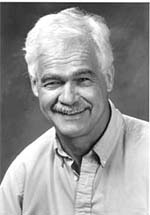|
April 28, 2003
Awards and Honors
Physicist Nauenberg to speak at Royal Society
of London
Professor emeritus of physics Michael Nauenberg will be a keynote speaker
at the Robert Hooke Tercentenary Conference this summer, July 7 to 9,
at the Royal Society in London.
 |
Michael Nauenberg
UCSC Photo Services |
Robert Hooke (1635-1703) was one of the leading natural philosophers
of his day. The conference and related events commemorating the 300th
anniversary of Hooke's death have been organized under the auspices
of Gresham College, London, where Hooke spent most of his career.
Nauenberg will give the opening talk at the conference. In recent years,
Nauenberg has been doing research in the history of physics and mathematics
during the 17th and 18th centuries. He has published over a dozen articles
on the works of Hooke, Isaac Newton, and Christian Huygens.
In his talk, "Hooke's Contributions to Dynamics," Nauenberg
will describe Hooke's seminal contribution to the development of orbital
dynamics.
"During the second half of the 17th century, the fundamental problem
in astronomy was to understand the physical origin of Kepler's laws,
which were known from observations to describe accurately the motion
of the planets around the Sun," Nauenberg said.
Eventually, the mathematical solution was obtained by Newton, who presented
his result in a famous book, Mathematical Principles of Natural Philosophy,
first published in 1687. But it is not so well known that Hooke, almost
three decades earlier, had proposed the underlying physical concepts
that determine planetary motion, had presented his ideas in a small
tract published in 1674, and had communicated them directly to Newton
in a correspondence with him during the fall of 1679.
"In my talk, I will present some new historical evidence that
Hooke's ideas played a crucial role in Newton's understanding of Kepler's
area law, which allowed him to solve the problem of planetary motion,"
Nauenberg said.
Hooke, a true polymath, invented the universal joint, the iris diaphragm,
and the best compound microscope of his time. In his highly influential
book Micrographia, Hooke presented a detailed record of his observations
with the microscope, illustrated with marvellous drawings. Hooke also
played a major role in the rebuilding of London after the Great Fire
of 1666, along with his friend Christopher Wren.
Sessions at the Tercentenary Conference will be devoted to the full
range of Hooke's life, work, milieu, and legacy.
For more on the life and works of Robert Hooke, see:
http://www.ucmp.berkeley.edu/history/hooke.html
http://www.rod.beavon.clara.net/robert_hooke.htm
Return to Front Page
|